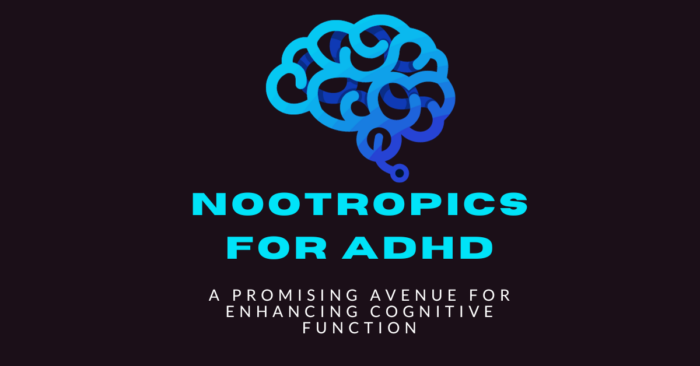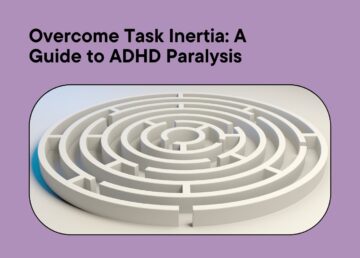Nootropics for ADHD: A Promising Avenue for Enhancing Cognitive Function

What is ADHD and Its Connection To Brain Chemistry
Attention deficit hyperactivity disorder (ADHD) is a pervasive neurodevelopmental condition characterized by persistent inattention, hyperactivity, and impulsivity. While the exact cause of ADHD remains under investigation, evidence suggests a significant role for imbalances in brain chemistry, particularly in the catecholamines, a group of neurotransmitters that include dopamine, norepinephrine, and epinephrine.
- Dopamine, often referred to as the “reward chemical,” plays a crucial role in motivation, reward processing, and decision-making. In individuals with ADHD, dopamine levels are often lower than in neurotypical controls, especially in the prefrontal cortex, a brain region responsible for executive functions. This dopamine deficiency is thought to contribute to the inattention, distractibility, and impulsivity that define ADHD.
- Norepinephrine, on the other hand, is involved in arousal, focus, and emotional regulation. It helps maintain wakefulness, enhances attention, and regulates mood. Reduced norepinephrine levels in individuals with ADHD may contribute to hyperactivity, restlessness, and emotional dysregulation.
- Epinephrine, also known as adrenaline, is the “fight-or-flight” hormone that prepares the body for quick action in response to stress or danger. It increases heart rate, blood pressure, and alertness. While epinephrine levels in individuals with ADHD are generally normal, the brain’s ability to regulate these levels may be impaired, leading to heightened anxiety, irritability, and emotional outbursts.
The interplay of these catecholamines is further complicated by the presence of other neurotransmitters, such as serotonin, glutamate, and GABA, which also play essential roles in regulating attention, motivation, and impulse control. A delicate balance of these neurotransmitters is crucial for maintaining healthy brain function and preventing the symptoms of ADHD.
Understanding the neurochemical underpinnings of ADHD has led to the development of various treatment strategies, including stimulant medications, non-stimulant medications, and neurofeedback training. While stimulant medications have been the mainstay of treatment, research is exploring the potential of non-stimulant options and neurofeedback to address the underlying neurotransmitter imbalances associated with ADHD.
Nootropics, a class of cognitive enhancers, have also gained attention in the ADHD space due to their potential to enhance focus, attention, and impulse control through a variety of mechanisms, including increasing dopamine and norepinephrine levels, enhancing neuroplasticity, and improving brain connectivity.
While further research is needed to fully elucidate the mechanisms of action and efficacy of nootropics in treating ADHD, the potential benefits they offer have piqued the interest of individuals seeking non-stimulant alternatives or complementary approaches to traditional ADHD treatments.

What are Nootropics
The term “nootropic” was coined by a Romanian chemist, Corneliu Giurgea, in 1964. He defined nootropics as “a substance that improves cognitive function without causing side effects.” Since then, the scope of nootropics has expanded, and they are now often referred to as “smart drugs” or “cognitive enhancers.”
Nootropics are a diverse group of substances that can be classified into several categories, including:
- Natural nootropics: These are substances found in nature, such as caffeine, L-arginine, and omega-3 fatty acids.
- Synthetic nootropics: These are man-made substances, such as piracetam, modafinil, and sulbutiamine.
- Prescription nootropics: These are FDA-approved medications that are used to treat specific conditions, such as ADHD and Alzheimer’s disease.
Nootropics are believed to work by targeting various mechanisms in the brain, including:
- Increasing neurotransmitter levels: Nootropics can increase levels of neurotransmitters such as dopamine, norepinephrine, and acetylcholine, which are involved in cognitive function.
- Enhancing neuroplasticity: Nootropics can promote the formation of new neural connections and improve brain plasticity, which is the brain’s ability to change and adapt.
- Balancing neurotransmitter levels: Nootropics can help to balance levels of neurotransmitters that are imbalanced in conditions such as ADHD and depression.
- Protecting brain cells: Nootropics can help to protect brain cells from damage caused by free radicals and other factors.

How can Nootropics Help to Treat ADHD
The potential of nootropics to address the cognitive symptoms of ADHD has sparked considerable interest in recent years. While more research is needed to confirm their efficacy and safety in treating ADHD, several mechanisms of action have been proposed to explain how nootropics may help manage ADHD symptoms.
- Enhancing Neurotransmitter Levels: Nootropics may target specific neurotransmitters involved in ADHD, such as dopamine and norepinephrine. These neurotransmitters play critical roles in regulating attention, impulse control, and motivation. By increasing or balancing levels of these neurotransmitters, nootropics may help improve these cognitive functions.
- Increasing Neuroplasticity: Neuroplasticity is the brain’s ability to adapt and form new neural connections. This process is essential for learning and memory. Nootropics may promote neuroplasticity, allowing the brain to develop new compensatory mechanisms to manage ADHD symptoms.
- Improving Brain Energy Metabolism: ADHD is often associated with impaired brain energy metabolism. Nootropics may enhance brain energy production, providing the brain with the fuel it needs to function optimally. This could improve cognitive performance and reduce symptoms of inattention and fatigue.Balancing Brainwave Activity: ADHD is linked to alterations in brainwave patterns, particularly in the prefrontal cortex. Nootropics may modulate brainwave activity, promoting more balanced and efficient brain function. This could lead to improved focus, attention, and impulse control.
- Supporting Healthy Brain Structure and Function: Nootropics may protect brain cells from damage caused by oxidative stress and other factors, promoting brain health and longevity. This could help prevent or slow down the cognitive decline that can sometimes accompany ADHD.
While these mechanisms of action are promising, further research is needed to fully understand how nootropics work in the context of ADHD. Studies are underway to evaluate the efficacy and safety of various nootropics for managing ADHD symptoms.
How do Nootropics Differ From Stimulant Drugs

Stimulant drugs and nootropics are both substances that have the potential to improve cognitive function. However, there are some key differences between the two.
Primary Aims:
- Stimulant drugs: Primary goal is to elevate neurotransmitter levels, such as dopamine and norepinephrine, to enhance focus, attention, and energy levels.
- Nootropics: Primary goal is to enhance cognitive function by boosting neuroplasticity, improving brain energy metabolism, and promoting healthy brain structure and function.
Action Mechanism:
- Stimulant drugs: Generally work by directly affecting neurotransmitter levels, often causing a surge in dopamine and norepinephrine, leading to potential side effects like anxiety, insomnia, and dependence.
- Nootropics: Typically work through more subtle mechanisms, such as enhancing neurotransmission, promoting brain plasticity, and protecting brain cells, resulting in a milder effect profile.
Side Effects:
- Stimulant drugs: Can cause a range of side effects, including anxiety, insomnia, increased heart rate, and potential for dependence.
- Nootropics: Generally have a milder side effect profile, with occasional reports of headaches, nausea, and irritability.
Long-Term Effects:
- Stimulant drugs: Long-term use of stimulant drugs can lead to tolerance, dependence, and potential cognitive impairments.
- Nootropics: Long-term use of nootropics is generally considered safe, with some studies suggesting potential benefits for brain health and cognitive function.
Treatment Considerations:
- Stimulant drugs: Often prescribed by healthcare professionals for ADHD, narcolepsy, and other conditions.
- Nootropics: Not regulated by the FDA and considered supplements, with limited controlled studies on their efficacy and safety in treating ADHD.
While both stimulant drugs and nootropics can potentially enhance cognitive function, they differ in their mechanisms of action, side effect profiles, and long-term effects. Stimulant drugs are more potent and may provide immediate benefits, but they also carry a higher risk of side effects and potential dependence. Nootropics are generally considered safer and may have longer-lasting benefits, but more research is needed to establish their efficacy and long-term safety in treating ADHD.
What Over The Counter Nootropics Are Used to Treat ADHD

As interest in alternative approaches to managing ADHD grows, individuals are increasingly turning to over-the-counter (OTC) nootropics as potential supplements to support cognitive function. These non-prescription nootropics are easily accessible, but it’s crucial to approach their use with caution, as they are not regulated by the FDA, and their safety and efficacy for ADHD treatment are still under investigation.
Caffeine:
- Mechanism of Action: Caffeine, a natural stimulant found in coffee, tea, and some supplements, is known to increase alertness and improve focus by blocking adenosine receptors in the brain.
- Potential Benefits for ADHD: Caffeine may enhance attention and concentration, providing temporary relief from ADHD symptoms. However, its effects can vary from person to person, and excessive consumption may lead to jitteriness or sleep disturbances.
L-Theanine:
- Mechanism of Action: Often found in tea leaves, L-theanine is an amino acid that promotes relaxation and has synergistic effects with caffeine, mitigating its jittery side effects.
- Potential Benefits for ADHD: L-Theanine may contribute to a calm and focused state by reducing anxiety without sedation. Some individuals find it helpful in managing the overstimulation associated with ADHD.
Omega-3 Fatty Acids:
- Mechanism of Action: Found in fatty fish and flaxseeds, omega-3 fatty acids are essential for brain health and have anti-inflammatory properties.
- Potential Benefits for ADHD: Some studies suggest that omega-3 supplementation may support cognitive function and reduce ADHD symptoms, particularly inattention. However, more research is needed to confirm its effectiveness.
Bacopa Monnieri:
- Mechanism of Action: Derived from an herb, Bacopa Monnieri has been traditionally used in Ayurvedic medicine and is believed to enhance cognitive function.
- Potential Benefits for ADHD: Bacopa Monnieri may improve memory and attention, potentially providing support for individuals with ADHD. Research is ongoing to understand its precise mechanisms and effectiveness.
Ginkgo Biloba:
- Mechanism of Action: Extracted from the leaves of the Ginkgo tree, Ginkgo Biloba is thought to improve blood flow and have antioxidant properties.
- Potential Benefits for ADHD: Some studies suggest that Ginkgo Biloba may enhance cognitive function and attention. However, more research is needed to determine its specific impact on ADHD symptoms.
Rhodiola Rosea:
- Mechanism of Action: Known as an adaptogen, Rhodiola Rosea may help the body adapt to stress and improve mental performance.
- Potential Benefits for ADHD: Preliminary research indicates that Rhodiola Rosea may have potential benefits for attention and fatigue, but more studies are required to establish its efficacy.
L-Carnitine:
- Mechanism of Action: L-Carnitine is an amino acid involved in energy production and mitochondrial function.
- Potential Benefits for ADHD: Some studies suggest that L-Carnitine supplementation may improve attention and behavior in individuals with ADHD, but further research is needed to confirm these findings.
It’s important to note that the effectiveness of OTC nootropics can vary based on individual factors, and their use should be approached with caution. Always consult with a healthcare professional before incorporating any supplement into your ADHD management plan.
What Prescription Nootropics Are Used to Treat ADHD

In the realm of ADHD treatment, prescription nootropics are medications approved by regulatory authorities such as the FDA to address the cognitive symptoms associated with ADHD. These medications are typically more potent than over-the-counter options and are often prescribed under the supervision of healthcare professionals. Some of the most popular prescription nootropics for ADHD include:
Atomoxetine:
- Mechanism of Action: Atomoxetine, marketed as Strattera, is a non-stimulant medication that primarily inhibits the reuptake of norepinephrine in the brain.
- Potential Benefits for ADHD: Strattera is particularly suitable for individuals who do not respond well to stimulant medications. It improves attention, reduces impulsivity, and helps regulate hyperactivity.
Guanfacine and Clonidine:
- Mechanism of Action: These medications, often used to treat high blood pressure, have also demonstrated efficacy in managing ADHD symptoms. Guanfacine and clonidine act on certain receptors in the brain, affecting norepinephrine levels.
- Potential Benefits for ADHD: They are particularly helpful in addressing hyperactivity, impulsivity, and emotional dysregulation in individuals with ADHD.
Modafinil and Armodafinil:
- Mechanism of Action: Modafinil and its longer-lasting counterpart, armodafinil, promote wakefulness and alertness. While their precise mechanism is not fully understood, they are thought to affect dopamine levels.
- Potential Benefits for ADHD: These medications are sometimes prescribed off-label for ADHD, especially in cases where traditional stimulant medications are not suitable.
Lisdexamfetamine:
- Mechanism of Action: Lisdexamfetamine, known by the brand name Vyvanse, is a prodrug that is converted into dextroamphetamine in the body. It increases dopamine and norepinephrine levels.
- Potential Benefits for ADHD: Vyvanse is an extended-release medication that provides a more gradual onset and sustained effect, offering a longer duration of symptom control.
If you are considering to take any of the above mentioned medications for treatment of ADHD, it is crucial that you consult your doctor or primary physician before making the decision.
What is the Efficacy of Nootropic Treatments for ADHD

Research on the efficacy of nootropics for ADHD is still in its early stages, and more studies are needed to determine their effectiveness and safety. However, some preliminary research suggests that nootropics may be helpful in managing ADHD symptoms.
Piracetam: Piracetam is one of the most well-studied nootropics, and a few small studies have shown that it may be effective in improving attention and focus in people with ADHD. However, these studies have been limited in size and scope, and more research is needed to confirm these findings.
Oxiracetam: Oxiracetam is another derivative of piracetam that has been shown to improve memory and focus in healthy individuals. However, there is limited research on its effectiveness for ADHD.
Alpha-GPC: Alpha-GPC is a choline precursor, which means that it is converted into choline in the body. Choline is a neurotransmitter that is important for memory and learning. Some small studies have shown that alpha-GPC may be effective in improving attention and focus in people with ADHD.
L-theanine: L-theanine is an amino acid that is found in green tea. It is thought to work by reducing stress and anxiety, which can improve cognitive function. Some small studies have shown that L-theanine may be helpful in reducing hyperactivity and impulsivity in people with ADHD.
Overall, the evidence for the efficacy of nootropics for ADHD is still mixed. More research is needed to determine which nootropics are most effective for treating ADHD symptoms and to develop standardized treatment protocols.
Important Considerations:
- Nootropics are not a cure for ADHD. They can be a helpful addition to other treatments, such as therapy and medication, but they are not a replacement for these treatments.
- Nootropics can interact with other medications. It is important to talk to your doctor before taking any nootropics, especially if you are taking other medications for ADHD or other conditions.
- Nootropics can have side effects. The most common side effects of nootropics are headache, nausea, and anxiety. If you experience any side effects that are bothersome, you should talk to your doctor.
If you are considering taking nootropics to treat your ADHD, it is important to talk to your doctor first. They can help you determine if nootropics are right for you and can recommend the best dosage and type of nootropic for your individual needs.
Conclusion
Attention deficit hyperactivity disorder (ADHD) is a common neurodevelopmental condition that affects millions of people worldwide. It is characterized by persistent inattention, hyperactivity, and impulsivity. While a variety of treatments are available for ADHD, including medication and therapy, there is a growing interest in the potential of nootropics to manage ADHD symptoms.
Nootropics are a class of substances that are purported to enhance cognitive function. They are often referred to as “smart drugs” or “brain boosters.” Research on the efficacy of nootropics for ADHD is still in its early stages, but some preliminary research suggests that they may be helpful in managing ADHD symptoms.
It is important to note that nootropics are not a cure for ADHD. They can be a helpful addition to other treatments, such as therapy and medication, but they are not a replacement for these treatments. Additionally, nootropics can interact with other medications. It is important to talk to your doctor before taking any nootropics, especially if you are taking other medications for ADHD or other conditions.
Frequently Asked Questions
What are the best nootropics for ADHD?
There is no one-size-fits-all answer to this question, as the best nootropics for ADHD will vary depending on the individual. However, some of the most promising nootropics for ADHD include:
- Piracetam: Piracetam is one of the most well-studied nootropics, and a few small studies have shown that it may be effective in improving attention and focus in people with ADHD. However, these studies have been limited in size and scope, and more research is needed to confirm these findings.
- Oxiracetam: Oxiracetam is another derivative of piracetam that has been shown to improve memory and focus in healthy individuals. However, there is limited research on its effectiveness for ADHD.
- Alpha-GPC: Alpha-GPC is a choline precursor, which means that it is converted into choline in the body. Choline is a neurotransmitter that is important for memory and learning. Some small studies have shown that alpha-GPC may be effective in improving attention and focus in people with ADHD.
- L-theanine: L-theanine is an amino acid that is found in green tea. It is thought to work by reducing stress and anxiety, which can improve cognitive function. Some small studies have shown that L-theanine may be helpful in reducing hyperactivity and impulsivity in people with ADHD.
What is the difference between smart drugs and nootropics for ADHD?
The terms “smart drugs” and “nootropics” are often used interchangeably, but there is a subtle difference between the two.
- Smart drugs are a broader term that encompasses any substance that is purported to enhance cognitive function. This includes both prescription medications and over-the-counter supplements.
- Nootropics are a subset of smart drugs that are specifically designed to improve cognitive function without causing significant side effects. Nootropics are often referred to as “cognitive enhancers” or “brain boosters.”
There is some overlap between the two categories, but not all smart drugs are nootropics, and not all nootropics are smart drugs. For example, some prescription medications for ADHD, such as Adderall and Ritalin, are considered smart drugs, but they are not typically considered nootropics because they can have significant side effects.
Can children with ADHD take nootropics?
No, children with ADHD should not take nootropics. Nootropics are not FDA-approved for use in children, and there is not enough research to know whether they are safe and effective for this population. Additionally, some nootropics may interact with other medications that children with ADHD may be taking, such as stimulants or antidepressants.
If you are considering giving your child nootropics, it is important to talk to your doctor first. They can help you determine if nootropics are right for your child and can recommend the safest and most effective option.
What nootropic is most like Adderall?
No nootropic is exactly like Adderall. Adderall is a prescription medication that is used to treat ADHD. It is a stimulant that works by increasing the levels of dopamine and norepinephrine in the brain. Nootropics are typically over-the-counter supplements that are thought to improve cognitive function. They work in a variety of ways, and there is no single nootropic that is as effective as Adderall for treating ADHD.
Which vitamins and minerals can be used along with ADHD supplements?
There are several vitamins and minerals that may be beneficial for people with ADHD, both on their own and in conjunction with other treatments, such as medication or therapy. These nutrients may help to improve focus, attention, and overall cognitive function.
Here are some of the vitamins and minerals that may be helpful for people with ADHD:
- Vitamin B complex: This group of vitamins is essential for brain function and may help to improve mood, energy levels, and cognitive performance.
- Magnesium: Magnesium is a mineral that plays a role in many bodily functions, including nerve signaling. Low magnesium levels have been linked to ADHD symptoms.
- Omega-3 fatty acids: Omega-3 fatty acids are important for brain health and may help to improve focus, attention, and overall cognitive function.
- Zinc: Zinc is a mineral that is essential for brain development and function. Low zinc levels have been linked to ADHD symptoms.
- Vitamin D: Vitamin D is essential for calcium absorption and bone health, but it may also play a role in brain function. Some studies suggest that vitamin D deficiency may be linked to ADHD symptoms.
References
- Zavadenko, N.N., 2023. Neurodevelopmental Disorders in Children: Neuroplasticity and the Possibilities of Nootropic Pharmacotherapy. Neurochemical Journal, 17(2), pp.202-210.
- Froestl, W., Muhs, A. and Pfeifer, A., 2012. Cognitive enhancers (nootropics). Part 1: drugs interacting with receptors. Journal of Alzheimer’s disease, 32(4), pp.793-887.
- Truter, I., 2016. Prescribing Patterns of Psychostimulants, Agents Used For ADHD And Nootropics. Value in Health, 19(7), p.A528.
- Sharma, A., L Gerbarg, P. and P Brown, R., 2015. Non-pharmacological treatments for ADHD in youth. Adolescent Psychiatry, 5(2), pp.84-95.
- Joshi Pranav, C., 2013. A review on natural memory enhancers (Nootropics). Unique Journal of Engineering and advanced sciences, 1(01), pp.8-18.





